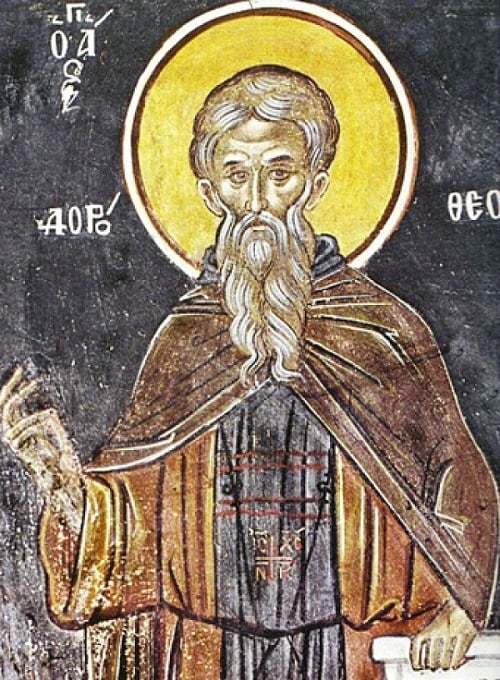Abba Dorotheos: Instruction 11 (Abba Dorotheos)
18 Ιανουαρίου 2017
115. It happened that a great Elder was with his disciples in a place where there were all kinds of cypresses, large and small. He said to one of his disciples: ‘Pull up that little cypress plant’. It was very small and the monk had no difficulty in pulling it up with one hand. Then the Elder indicated another, bigger than the first, and said ‘Pull that one up as well’. After giving it a shake, the monk used both hands to uproot it. He then pointed to another, even bigger, and the monk uprooted that, too, though with more effort. The Elder then pointed to another one, even bigger. The monk shook it hard and expended much effort and sweat before finally uprooting it. The next one was even bigger and despite his sweat and efforts, the monk wasn’t able to pull it up. When the Elder saw that he couldn’t, he told another brother to go and help him, and together they uprooted it. Then the Elder said to the monks: ‘That’s how it is with the passions, my brethren. While they’re little, if we want, we can cut them off easily. But if we ignore them, as being unimportant, they become hardier and then more effort is required. And if they strike deep roots within us, then, no matter how hard we try, we can’t cut them off on our own, unless we have the help of some saints, who, after God, will defend us’.

Do you see the power that the words of the holy Elders have? The Prophet teaches us about this when he writes in the Psalm: ‘Wretched daughter of Babylon! Blessed is he who will deal with you as you have dealt with us. Blessed is he who will seize your infants and dash them against the rock (Ps. 136, 8-9. Septuagint).
116. But let’s investigate his words in turn. Babylon is called confusion, since this is Babel, which is the same as Sychem [Shechem][1]. The daughter of Babylon is the name for enmity. Because first the soul becomes confused and loses its discernment[2] and then it commits sin. He calls her ‘wretched’, because, as I’ve told you before, evil is without substance and without form. It’s born from non-existence, because of our heedlessness and disappears again when we fight it, returning to nonentity. On this, the saint says: ‘Blessed is he who will repay you for the evil you’ve done to us’. So, on the one hand, we have to recognize what we’ve given, and, on the other, what we’ve received in exchange and what we should pay back. We gave our will, and, in exchange, received sin. He extols the promise given as repayment: that we will not do the same thing again. And he adds: ‘Blessed is he who will seize your infants and dash them against the rock’. By this he means: ‘Blessed is he who doesn’t allow your offspring, that is wicked thoughts, to grow, even in the beginning and thus work their evil in him. On the contrary, while they’re still weak, before they’re nourished and increase against him, he grabs hold of them and dashes them against the rock, which is Christ. In this way he exterminates them by having recourse to Christ’.
117. This is how the Elders and Holy Scripture all agree and extol those who strive to cut off their passions while they’re still weak, before their pain and bitterness are felt. So, let’s work with a will, my brethren, and we’ll find mercy. Just a little effort and we’ll find abundant rest.
The Fathers said that we should carefully cleanse every facet of our soul. In other words, that we should examine, every evening, how we’ve spent the day and then, in the morning, how we’ve spent the night. And we repent to God for any sins we’ve committed. Truth to tell, since we’re so sinful we should really examine ourselves every six hours to see how we’ve spent them and how we’ve sinned. Each of us should say: ‘Have I perhaps hurt someone with what I’ve said? Perhaps I saw them doing something and judged them or derided them or gossiped about them. Did I perhaps ask the cellarer for something, and complained when he wouldn’t give it to me? Was the food not so good and I said something derogatory about the cook and hurt his feelings? Did I perhaps complain to myself because I felt disgusted about something?’ Because if you go on complaining to yourself, that’s a sin. And again he says: ‘Did the canonarch or one of the other brothers say something to me and I couldn’t take it and spoke back to him?’ So, every day we have to ask ourselves how we’ve done. And the same goes for the nights. Did we get up willingly for the vigil? Did we not pay attention to the monk who woke us, or did we complain about him? We have to understand that the monk who wakes us for the vigil is doing us a great favour and is the harbinger of great, good things, since he’s waking us up to speak to God, to seek forgiveness for our sins and enlightenment. So aren’t we under an obligation to thank him? Really, we should be aware that through the assistance of our brother, we’ve gained our salvation.





